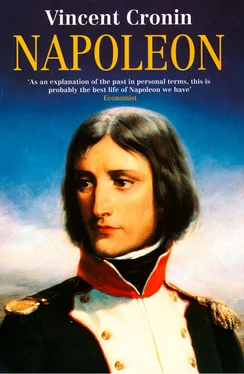Vincent Cronin - Napoleon
Здесь есть возможность читать онлайн «Vincent Cronin - Napoleon» — ознакомительный отрывок электронной книги совершенно бесплатно, а после прочтения отрывка купить полную версию. В некоторых случаях можно слушать аудио, скачать через торрент в формате fb2 и присутствует краткое содержание. Жанр: unrecognised, на английском языке. Описание произведения, (предисловие) а так же отзывы посетителей доступны на портале библиотеки ЛибКат.
- Название:Napoleon
- Автор:
- Жанр:
- Год:неизвестен
- ISBN:нет данных
- Рейтинг книги:3 / 5. Голосов: 1
-
Избранное:Добавить в избранное
- Отзывы:
-
Ваша оценка:
- 60
- 1
- 2
- 3
- 4
- 5
Napoleon: краткое содержание, описание и аннотация
Предлагаем к чтению аннотацию, описание, краткое содержание или предисловие (зависит от того, что написал сам автор книги «Napoleon»). Если вы не нашли необходимую информацию о книге — напишите в комментариях, мы постараемся отыскать её.
Napoleon — читать онлайн ознакомительный отрывок
Ниже представлен текст книги, разбитый по страницам. Система сохранения места последней прочитанной страницы, позволяет с удобством читать онлайн бесплатно книгу «Napoleon», без необходимости каждый раз заново искать на чём Вы остановились. Поставьте закладку, и сможете в любой момент перейти на страницу, на которой закончили чтение.
Интервал:
Закладка:
I wish to thank for their generous help Dr Frank G. Healey, Dr Paul Arrighi, Monsieur Etienne Leca, Conservateur of the Bibliothèque Municipale in Ajaccio, Monsieur J. Leblanc of the Musée d’Ajaccio, Mr Nigel Samuel, who kindly allowed me to use his manuscript of part of ‘ Clisson et Eugénie ’, Madame L. Hautecoeur of the Bibliothèque de l’Institut de France, Mademoiselle Hélène Michaud of the Bibliothèque Thiers, Miss Banner of the Royal College of Music, Mrs Barbara Lowe, who typed the book, and, for a number of Napoleonic details, my friend Mr Basil Rooke-Ley.
CHAPTER 1 A Happy Childhood
ON the morning of 2 June 1764 the bronze bells of Ajaccio cathedral began to peal and the little town’s important people – landowners, army officers, judges and notaries – with their ladies in silk dresses, climbed the five steps leading to the sober-fronted cathedral, passed through the doorway, and took their places for the most fashionable wedding of the year. Carlo Buonaparte of Ajaccio, a tall, slim lawyer aged eighteen, was marrying the beautiful fourteen-year-old Letizia Ramolino, also of Ajaccio. As everyone knew, it was a love match. Carlo had been studying law at Pisa University and suddenly, without taking his degree, he had sailed home to propose to Letizia, and had been accepted. On the Continent upper-class marriages were affairs of birth and money, but in unsophisticated Corsica they were usually affairs of the heart. Not that the present wedding was unsatisfactory from the point of view of lineage and property. Far from it.
The Buonapartes lived originally in Tuscany. An army officer named Ugo is mentioned in an act of 1122 as fighting beside Frederick the One-Eyed, Duke of Swabia, to subdue Tuscany, and it was Ugo’s nephew, when he became a member of the Council governing Florence, who took the surname Buonaparte, meaning ‘the good party’. By ‘the good party’ he designated the Emperor’s men, believers in knightly prowess and the unity of Italy, over against the papal party, which included the new business class. But the ‘good party’ lost power and Ugo Buonaparte had to leave Florence. He went to live in the seaport of Sarzana. In the troubled first half of the sixteenth century one of Ugo’s descendants, a certain Francesco Buonaparte, sailed from Sarzana to seek his fortune in Corsica, which had begun to be colonized by Genoa, and here Francesco’s family had made a good name for themselves, chiefly as lawyers active in local government.
The Ramolinos were descended from the Counts of Collalto in Lombardy and had been established in Corsica for 250 years. Like the Buonapartes, they had married mainly into other long-established families of Italian origin, and sons went into the army. Letizia’s father had commanded the Ajaccio garrison, and later became Inspector General of Roads and Bridges, an unexacting post since Corsica was practically devoid of both. He died when Letizia was five, and two years later her mother married Captain Franz Fesch, a Swiss officer serving in the Genoese navy. It was her Swiss stepfather who gave Letizia away.
From the material point of view also the couple were well matched. Carlo, whose father had died four years earlier, brought his wife the family house in the Via Malerba, two of the best vineyards near Ajaccio, and some pasture and arable land, while Letizia’s dowry consisted of thirty-one acres, a mill and a big oven for baking bread, valued altogether at 6,705 livres. With Carlo’s property probably worth about the same, the young couple could expect an annual income of about 670 livres, mainly in kind, equivalent to £700 today. *
So the dashing young lawyer married the army officer’s beautiful daughter and when the last guest had gone took her to live on the first floor of his big house with shutters in a narrow street near the sea. On the ground floor lived Carlo’s mother and his rich, gout-ridden Uncle Lucciano, Archdeacon of Ajaccio; on the top floor lived cousins, who could sometimes be difficult, and now to the household was added Letizia. She was slender and petite – only five feet one. Her eyes were dark brown, her hair chestnut, her teeth white, and she possessed two features of the thoroughbred: a slender, finely bridged nose and long white hands. Despite her beauty, she was extremely shy, sometimes to the point of awkwardness. She was also, even for a Corsican, unusually devout. She went to Mass every day, a practice she was to retain all her life.
Corsica at this time was attracting attention by her efforts to become independent. In 1755 a twenty-nine-year-old ensign in the Corsican Guard serving the King of Naples, Pasquale Paoli by name, returned to the island, put himself at the head of guerrillas and drove the Genoese out of all central Corsica, bottling them up in a few ports, of which Ajaccio was one. He then gave the Corsicans a democratic constitution, with himself as chief executive, and proceeded to rule wisely. He stamped out bandits, built some roads, founded schools and even a small university.
Carlo Buonaparte, like every Corsican, detested Genoese rule, which taxed Corsicans heavily and reserved the best jobs for supercilious Genoese noblemen. He wanted his country to be completely free and, what is more, was prepared to work for that. He was too young to stand for office or even to vote, but he paid visits to Paoli, and two years after his marriage he took Letizia with him on the three-day horseback journey to Corte, Paoli’s fortress capital. Usually Letizia went out only for Mass, and evidently Carlo wanted to show off his striking young wife.
Paoli was a tall, heavy man with reddish-blond hair and piercing blue eyes. He lived in a house guarded by five large dogs, and himself somewhat resembled a friendly mastiff. In his green uniform with gold embroidery, all day he walked up and down, up and down, pulsating with energy, dictating to his secretary or quoting Livy and Plutarch. He drew strength from the classics, as other men from the Bible, and would say, ‘I defy Rome, Sparta or Thebes to show me thirty years of such patriotism as Corsica can boast.’
Paoli was a born bachelor, forty-one years old, and besides lived only for Corsican independence. But he appreciated shy Letizia. So much so that in the evenings he stopped pacing, drew up a chair and played reversi – a card game – with her. Letizia won so often that Paoli told her she had the game in her blood.
Paoli was still very much the guerrilla leader. He told Carlo that he intended to make a diversionary attack on the nearby Genoese island of Capraia, so that Genoese troops in Corsican ports would hurry to Capraia’s defence. This would anger the Pope, who had originally given Corsica and Capraia to Genoa, and Paoli asked Carlo to go to Rome as his ambassador in order to prevent any counter-measures. This was an honour and a great mark of trust in twenty-year-old Carlo.
Leaving Letizia with his mother, Carlo sailed for Rome. It was no easy task he had been set, for the five bishops in Corsica, all appointed from Genoa, continually sent Rome adverse reports on Paoli. However, Carlo was a good talker and his courteous manners made a favourable impression. He explained Paoli’s policy so ably that Rome refrained from reprisals. He did, however, find the Holy City extremely expensive and to get home had to borrow his fare from a Corsican named Saliceti, one of the Pope’s doctors.
Back in Ajaccio, Carlo could feel well satisfied. Paoli was pleased with his work and – perhaps the games of reversi had something to do with it – people were saying that he looked on Carlo as his likely successor. Letizia, after having had the sadness of losing first a boy, then a girl in infancy, was now the proud mother of a healthy son, Giuseppe.
With the suddenness of a Corsican thunderstorm, this happiness was marred. Paoli in a sense had succeeded too well, for the Genoese, realizing the game was up, had decided to sell Corsica. The buyer was the King of France, Louis XV. He had recently lost Minorca and was anxious to redress his power in the Mediterranean. He signed the deed of purchase at Versailles on 15 May 1768, and at once made plans for taking possession.
Читать дальшеИнтервал:
Закладка:
Похожие книги на «Napoleon»
Представляем Вашему вниманию похожие книги на «Napoleon» списком для выбора. Мы отобрали схожую по названию и смыслу литературу в надежде предоставить читателям больше вариантов отыскать новые, интересные, ещё непрочитанные произведения.
Обсуждение, отзывы о книге «Napoleon» и просто собственные мнения читателей. Оставьте ваши комментарии, напишите, что Вы думаете о произведении, его смысле или главных героях. Укажите что конкретно понравилось, а что нет, и почему Вы так считаете.












